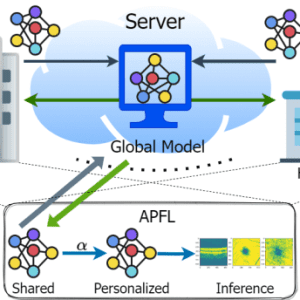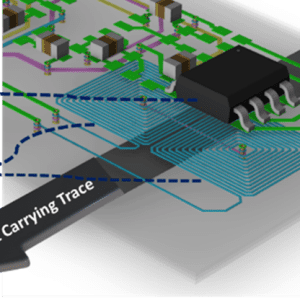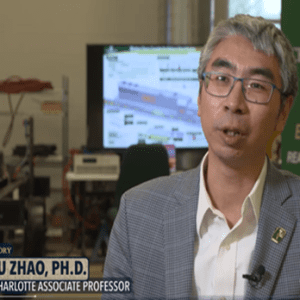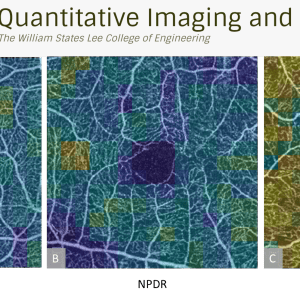Spotlights

10 Under Ten: Recent ECE graduate driving change in their careers and communities
Ten standout recent graduates took center stage at UNC Charlotte’s eighth annual 10 Under Ten Awards on Thursday, Feb. 19, filling the Popp Martin Student Union with Niner pride. Each year, the UNC Charlotte GOLD Alumni Network honors graduates from the past decade who not only excel in their careers but make a meaningful impact through volunteerism and philanthropy […]

COAR Lab: Pushing the Boundaries of Safe AI, Learning, and Multi-Agent Autonomy
The Control, Optimization, Autonomy & Robotics (COAR) Lab, developed by Dr. Dipankar Maity, is advancing the foundations of safe AI, learning, and multi-agent autonomous decision-making. Its research pushes the scientific boundaries of multi-agent reinforcement learning, strategic and adversarial game theory, and safe and robust autonomous control. A core focus is developing principled algorithms that enable […]

Innovation on Electric Grid Reliability and Power Quality
Dr. Sukumar Kamalasadan, Professor of Electrical and Computer Engineering and Distinguished Scholar of the College of Engineering, won a 2024 NC Innovation Award for his project “Grid Ancillary Services with Uninterruptible Power Supply (GAUPS)”. Funded by a $500 million state budget, NCInnovation (NCI) supports innovative researchers from North Carolina’s public universities that have been proven to have commercial […]

ECE Professor’s Research on AI for Public Safety wins NSF Spotlight
Dr. Hamed Tabkhi’s innovative project on advancing public safety through AI/ML has been spotlighted in NSF’s Smart and Connected Communities (S&CC) program. His project, “Building Safe and Secure Communities through Real-Time Edge Video Analytics,” combines computer vision, behavioral analysis, and edge computing to address urban safety concerns. Dr. Tabkhi has received a new NSF Grant, NSF CIVIC […]

Smart Wireless Communication Networks
Dr. Ran Zhang, Assistant Professor of ECE, is developing new UAV communication networks with a dynamic UAV lineup. His multi-drone prototyping project has been extended to three autonomous drones which can decide its movement via onboard intelligence and inter-communicate via onboard WiFi. The goal is to develop an autonomous multi-drone platform free of human intervention […]

AI for Ophthalmic Diagnosis
Dr. Minhaj Nur Alam, Assistant Professor of ECE, is working with clinical collaborators at Wake Forest, Illinois Health, and Stanford to develop novel federated learning approaches for the prediction of geographic atrophy which is an advanced form of age-related macular degeneration (AMD). AMD is one of the leading causes of severe vision loss. Clinical deployment […]

Research in Broad Sensing Technologies
Dr. Babak Parkhideh advanced his research in broad sensing technologies by collaborating on two highly competitive projects with scientists from the University of Maryland, College Park, and UNC Charlotte’s College of Computing and Informatics. In the project with UMD, Dr. Parkhideh is leading research on ultrafast, non-intrusive current sensing. If successful, this work could enable […]

Wireless Power Transfer for Rail Electrification
Dr. Tiefu Zhao from the Department of Electrical and Computer Engineering, along with Dr. Shen-En Chen and Dr. Nicole Braxtan from the Department of Civil and Environmental Engineering, has spearheaded groundbreaking research to develop the first wireless power transfer (WPT) technology for railway applications in the U.S. This research has secured over $1 million in […]

AI and Hardware Security for resilient Electric Power Systems
Research in the Hardware and Embedded Design and Security (HEADS) lab focuses on hardware-based authentication framework using strong physical unclonable functions (PUFs), new authentication techniques, incorporating lightweight cryptographic primitives, and novel pre-boot authentication and storage encryption functions for trusted platform modules (TPM). Recent research develops, validates, and demonstrates CyberPREPS, a concurrent learning cyber-physical framework for […]

Research in Quantitative Imaging and Artificial Intelligence
The nascent field of artificial intelligence (AI) and machine learning (ML) have experienced unprecedented growth in recent times, especially in healthcare and biomedical applications. For example, artificial neural networks have revolutionized the analysis of nonlinear functions with millions of inputs, however, most of the work is still superficial in medical AI, primarily focusing on downstream […]